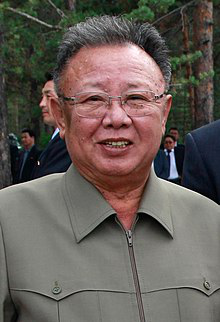

Workers’ Party of Korea
Yuri Kim 16 February 1941 Camp Voroshilov, Primorsky Krai, Far Eastern Federal District, Russian SFSR, Soviet Union 16 February 1942 Baekdu Mountain, Japanese Koreaa
17 December 2011(2011-12-17) (70) Pyongyang, North Korea
8 October 1997 – 17 December 2011
Second supreme leader of North Korea Not to be confused with Kim Jong-gil, Kim Yong-il, Kim Jong-pil, Kim Jong-il (athlete), or Kim Jung-il (writer). Eternal Leader Generalissimo Kim Jong-il 김정일 Kim in August 2011General Secretary of the Workers’ Party of KoreaIn office 8 October 1997 – 17 December 2011Preceded by Kim Il-sungSucceeded by Kim Jong-unChairman of the National Defence CommissionIn office 9 April 1993 – 17 December 2011DeputyO Jin-u Jo Myong-rokPreceded by Kim Il-sungSucceeded by Kim Jong-un (as First Chairman) Personal detailsBornYuri Kim (1941-02-16 ) 16 February 1941 Camp Voroshilov, Primorsky Krai, Far Eastern Federal District, Russian SFSR, Soviet Union (Soviet records) (1942-02-16 ) 16 February 1942 Baekdu Mountain, Japanese Korea (North Korean biography and records)Died17 December 2011(2011-12-17) (aged 70) Pyongyang, North KoreaCause of deathMyocardial infarctionResting placeKumsusan Palace of the Sun, Pyongyang, North KoreaNationalityNorth Korean Soviet (Koryo-saram)Political partyWorkers' Party of KoreaSpouse(s)Hong Il-chon (m. 1966; div. 1969) Kim Young-sook (m. 1974; his death 2011) Domestic partnerSong Hye-rim (1968–2002) Ko Yong-hui (1977–2004) Kim Ok (2004–2011)ChildrenKim Hye-kyung Kim Jong-nam Kim Sol-song Kim Jong-chul Kim Jong-un Kim Yo-jongMotherKim Jong-sukFatherKim Il-sungRelativesKim dynastyEducationMangyongdae Revolutionary SchoolAlma materKim Il-sung UniversitySignatureMilitary serviceAllegiance North KoreaBranch/service Korean People's ArmyYears of service1991–2011Rank Taewonsu (대원수, roughly translated as Grand Marshal or Generalissimo)CommandsSupreme CommanderKorean nameChosŏn'gŭl김정일 Hancha金正日 Revised RomanizationGim Jeong(-)ilMcCune–ReischauerKim Chŏngil Central institution membership 1980–2011: Member, Presidium of the Political Bureau of the 6th Central Committee of the Workers' Party of Korea 1974–2011: Member, Political Bureau of the 5th, 6th Central Committee of the Workers' Party of Korea 1972–1997: Secretariat of the Workers' Party of Korea 1972–2011: Member, 5th, 6th Central Committee of the Workers' Party of Korea 1982–2011: Deputy, 7th, 8th, 9th, 10th, 11th, 12th Supreme People's Assembly Other offices held 1997–2011: Chairman, Central Military Commission of the Workers' Party of Korea 1980–1997: Member, Central Military Commission of the Workers' Party of Korea 1990–1993: First Vice Chairman, National Defense Commission Leader of the Democratic People's Republic of Korea ← Kim Il-sung Kim Jong-un → Kim Jong-il (/ˌ k ɪ m dʒ ɒ ŋ ˈ ɪ l / ; Korean: 김정일 ; Korean pronunciation: ; born Yuri Kim (Russian: Юрий Ким ); 16 February 1941 – 17 December 2011) was a North Korean politician who served as the second Supreme Leader of North Korea from 1994 to 2011. He led North Korea from the 1994 death of his father Kim Il-sung, the first Supreme Leader, until his own death in 2011, when he was succeeded by his son, Kim Jong-un. In the early 1980s, Kim had become the heir apparent for the leadership of the Democratic People's Republic of Korea (DPRK) and assumed important posts in the party and army organs. Kim succeeded his father and DPRK founder Kim Il-sung, following the elder Kim's death in 1994. Kim was the General Secretary of the Workers' Party of Korea (WPK), WPK Presidium, Chairman of the National Defence Commission (NDC) of North Korea and the Supreme Commander of the Korean People's Army (KPA), the fourth-largest standing army in the world. Kim ruled North Korea as a repressive and totalitarian dictatorship. Kim assumed leadership during a period of catastrophic economic crisis amidst the dissolution of the Soviet Union, on which it was heavily dependent for trade in food and other supplies, which brought a famine. While the famine had ended by the late 1990s, food scarcity continued to be a problem throughout his tenure. Kim strengthened the role of the military by his Songun ("military-first") policies, making the army the central organizer of civil society. Kim's rule also saw tentative economic reforms, including the opening of the Kaesong Industrial Park in 2003. In April 2009, North Korea's constitution was amended to refer to him and his successors as the "supreme leader of the DPRK". The most common colloquial title given to Kim was "Dear Leader" to distinguish him from his father Kim Il-sung, the "Great Leader". Following Kim's failure to appear at important public events in 2008, foreign observers assumed that Kim had either fallen seriously ill or died. On 19 December 2011, the North Korean government announced that he had died two days earlier, whereupon his third son, Kim Jong-un, was promoted to a senior position in the ruling WPK and succeeded him. After his death, Kim was designated the "Eternal General Secretary" of the WPK and the "Eternal Chairman of the National Defence Commission", in keeping with the tradition of establishing eternal posts for the dead members of the Kim dynasty.

We use cookies
We use cookies and other tracking technologies to improve your browsing experience on our website, to show you personalized content and targeted ads, to analyze our website traffic, and to understand where our visitors are coming from. Privacy Policy.